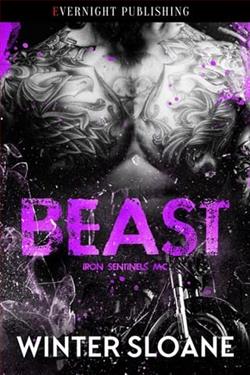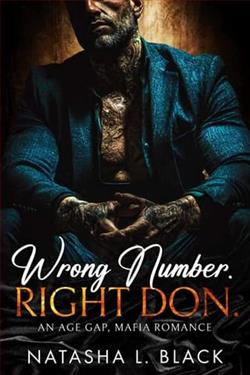Page 27 of Forced Virgin Bride of the Bratva
Darya doesn’t pause or glance about. She walks straight through the gathering like it’s a hallway in her own home, because in many ways, it is.
She stops in front of me. Her eyes flick over me, hard and assessing. “Is it true?” she asks. Her voice hasn’t changed. Cold and precise, honed over decades. A blade in human form. “You’re marrying her?”
I straighten. My fingers tense around the untouched glass. “I planned to tell you in person,” I say.
It sounds rehearsed. Weak, even to me.
Darya raises a hand. “Don’t insult me.”
She doesn’t raise her voice. Her palm lowers slowly, fingers curling back to her side.
Around us, no one moves. Even the staff keep still. The room is frozen in that moment between command and consequence.
“I didn’t make it to seventy years old to be informed of my son’s political alliance through gossip,” she says, quieter now, but each word lands with precision. “Or to find out about it after it’s already in motion.”
“It’s not finalized,” I reply.
“But it’s happening.” It isn’t a question.
I don’t answer. That, too, says enough.
Darya’s mouth presses into a thin line. Her gaze sharpens. Then she steps in closer, just enough that only I can hear what comes next.
“If you’re marrying her to keep your seat at this table, you better be certain she won’t cost you the throne. She’s Matías Ortega’s daughter!” Darya’s voice cracks across the room, sharp enough to slice through smoke and silence. It breaks against the marble floors and polished glass, rattling the steadiness of every man present.
My lip curls. “I know. It’s hardly as if I have a choice.”
That seems to crack something inside of her. Darya’s eyes narrow, and her hands tremble. Her fingers shake with a fury too long suppressed, her posture rigid as she fights to maintain dignity.
“You dare to speak to me that way?”
I straighten. There’s no apology on my lips, but I duck my head, force down a scowl. “It’s the truth. I—”
“The man who tried to have you killed,” she spits. Her breath catches. “The man who left you bleeding, who sent men to carve your name from this family’s ledger.”
She spins to face the room. Her voice splinters. “I buried my son in my heart for ten years. I mourned him. Lit candles for him.”
A hush falls across the gathering. No one lifts a glass. No one blinks.
“I thought he wasdead.”
Emotion claws up her throat and out, raw and unrefined. Grief pours from her in a wave, years of control undone in seconds. Her shoulders heave once, like her body remembersthe weight of waiting for a call that never came, the horror of preparing to grieve a closed casket.
Andrei looks down. His mouth is tight. He can’t meet her eyes.
I stand rooted in place, the muscle in my jaw clenched so tightly it aches. Her pain is real. I don’t deny it. I feel it—because it mirrors mine in ways I don’t speak aloud. But pride anchors me, holds me steady while guilt gnaws under my ribs.
“You think you can rebuild our name with the blood of the same family who destroyed it?” she demands, turning her fire back on me.
“Now you marry into that bloodline?” she chokes. “You bring her into this house? Into our name? I would have been willing to forgive it, but now you embarrass me by saying youhave no choice?”
The words hang like smoke in the air, thick with disbelief.
I meet her eyes. “She’s not him,” I say.
Three words. All I offer.
Her face twists. Something ugly rises behind her eyes. Not sadness. Not even rage. Something fouler.















